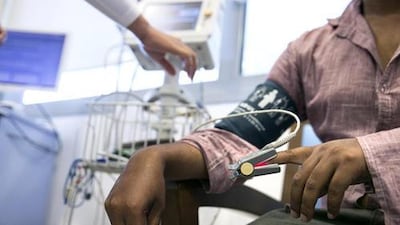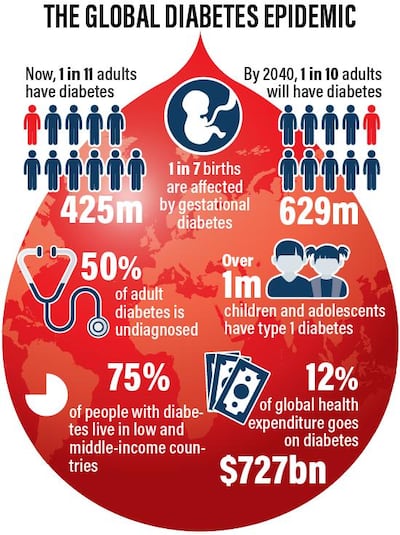Researchers in the UAE are seeking thousands of Emiratis to participate in a study that will help them to understand the reasons behind the high levels of diabetes and obesity in the country.
A partnership between Dubai Health Authority and New York University Abu Dhabi will build on the early stages of the UAE Healthy Future Study that was sidelined this year by the coronavirus pandemic.
So far, 4,000 citizens have taken part in Abu Dhabi, but doctors and academics now want to expand the cohort to 20,000 people across the country.
Data collected will support the Public Health Research Centre at NYU Abu Dhabi to determine the risk factors and causes of common health conditions such as cardiovascular disease and diabetes.
“We want to highlight again the chronic diseases in the country and expand on the project started three years ago to become a national initiative,” said Dr Muna Tahlak, chief executive officer of Latifa Hospital for Women and Children.
“This is one of the best studies we can do to look at risk factors.
“We know what they are from other studies abroad, but there is nothing specific to this region.”
Study results will be evaluated in detail every five years for the next 20 years or so, to gain a wider understanding of the risk factors associated with obesity, diabetes and cardiovascular disease.
These will include genetic, microbial and biochemical factors gleaned from a simple health and lifestyle questionnaire, physical measurements, blood and urine samples and a mouth rinse.
Subjects will be contacted again for follow-up questions or be required to have a repeat assessment by visiting a health clinic.
Health will be monitored over the future years in the first longitudinal study of its kind on Emiratis.
The results will enable health authorities to provide tailored advice and services to meet the needs of citizens.
“Genetically, we know that many things are different [with Emiratis] and the whole world is not the same,” Dr Tahlak said.
“We want healthy Emiratis over the age of 18 to take part.
“Once we recruit them they will be in the study for years to come with annual follow-ups in questionnaires on their lifestyle and health, so we can come up with good data to find out what are the biggest risk factors for these chronic diseases.
“This will only succeed with willing participants.”
The DHA and Department of Health Abu Dhabi are already involved in the research, with the Ministry of Health and Prevention due to follow with a co-operation agreement.
Participants can sign up online and visit the Dubai blood bank to have their measurements checked. Other emirates will also list drop-in clinics where Emiratis can take part.
“This is a major collaboration between public health institutions and academia in the UAE,” said Dr Abdishakur Abdulle, associate director of the Public Health Research Centre, NYUAD.
“We cannot reach out to the community without the help of health authorities and the public.
“Previously, we have found people have not had the time or the ease of access to give us the required information, but now it is easier than ever.”
Few studies exist of demographics of Arab descent and health authorities are restricted to following medical research conducted on Caucasian populations from Europe and America.
The study closest in similarity to the research planned for the UAE Healthy Future project was published in 2006.
A cohort of 1,500 UAE citizens between 35 and 70 took part in the Prospective Urban Rural Epidemiological survey to look at health-related behaviours.
A follow-up Ministry of Health and Prevention report in 2015 revealed cardiovascular disease as a leading cause of premature death in the UAE.
It is most commonly attributed to obesity, high-blood pressure, lack of physical activity and smoking.
The World Health Organisation also cited it as the primary cause of death worldwide, accounting for 17.5 million deaths in 2012, about 31 per cent.
Doctors said screening for certain conditions should be tailored to suit the local population and not from international data.
“Screening criteria for diabetes patients usually begins in those aged 40 and over,” said Dr Fatheya Al Awadi, consultant endocrinologist at Dubai Hospital and chairperson of DHA’s diabetes committee.
“From a Dubai household survey conducted by the DHA and Dubai Statistics Centre last year, we learnt that diabetes starts at a much younger age in our population."
The survey revealed 19 per cent of Emiratis in Dubai were diabetic, with a further 12 per cent pre-diabetic.
In those over 40, almost half had the condition, while doctors said more people under 18 also had high blood sugar levels.
“Our screening age will come down to 30 under new guidelines to better match the needs of our population," Dr Al Awadi said.
“It is starting too early in our society and we want to understand why that is.”
To register to take part in the study, Emiratis can visit https://uaehealthyfuture.ae/en/home-2.



